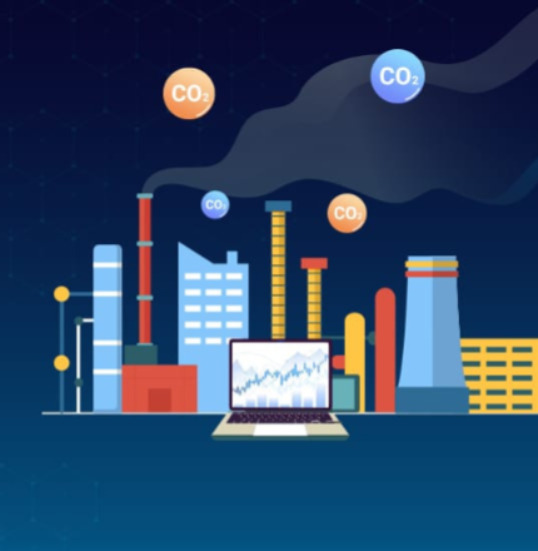Blockchain technology is quickly becoming a game-changer in the carbon market, helping to increase transparency, improve traceability, and reduce costs in carbon credit trading and emissions reduction projects. By providing a decentralized, secure, and immutable ledger for tracking carbon credits, blockchain ensures that every transaction is transparent and verifiable. Across the world, numerous carbon market projects have embraced blockchain to enhance their operations.
In this article, we’ll explore 10 leading carbon market projects that have integrated blockchain technology to revolutionize the way carbon credits are issued, traded, and retired. These projects represent the cutting edge of innovation in the carbon market, showcasing how blockchain is creating a more transparent and efficient market for carbon credits.
1. Verra + Blockchain (Global)
Verra, one of the world’s largest carbon certification organizations, is integrating blockchain to enhance the traceability of carbon credits issued under REDD+ (Reducing Emissions from Deforestation and Forest Degradation) projects. By using blockchain, Verra ensures that carbon credits are traceable and secure, reducing the risk of double counting or fraud in global carbon markets.
2. Toucan Protocol (Global)
Built on the Polygon blockchain, Toucan Protocol enables the tokenization of carbon credits, which can then be traded on decentralized exchanges. Toucan is focused on making carbon credits more accessible and tradable by offering a transparent and decentralized platform for managing carbon credits across global markets.
3. KlimaDAO (Global)
KlimaDAO is a decentralized autonomous organization that allows users to trade carbon credits in a decentralized marketplace. The platform has facilitated the trade of millions of carbon credits, using blockchain to provide a transparent and traceable marketplace for businesses and investors looking to offset their carbon footprints.
4. AirCarbon Exchange (Singapore)
AirCarbon Exchange is a blockchain-based trading platform for tokenized carbon credits, with a particular focus on the aviation and shipping industries. The platform allows carbon credits to be traded in real-time and enables companies to retire credits to offset their emissions. By using blockchain, AirCarbon Exchange reduces transaction costs and ensures that all credits are traceable.
5. Poseidon Foundation (Global)
Poseidon leverages blockchain technology to track and certify carbon credits from forest conservation projects. The platform provides real-time access to verified carbon credits, allowing organizations to purchase and retire credits while ensuring compliance with global carbon market standards. Blockchain technology ensures that the credits are transparent and verifiable.
6. Carbonplace (Global)
A consortium of global banks, Carbonplace is using blockchain to facilitate cross-border carbon credit trading. The platform provides a decentralized, transparent marketplace for businesses to buy, sell, and trade carbon credits, ensuring compliance with international standards and reducing the time and cost associated with cross-border transactions.
7. IBM & Veridium (Brazil)
IBM has partnered with Veridium to tokenize carbon credits from Amazon forest conservation projects using the Stellar blockchain. The project allows companies to purchase and trade carbon credits that represent verified emissions reductions from conservation efforts. Blockchain technology ensures the traceability and security of these credits.
8. Benin REDD+ Project (Africa)
In Africa, the Benin REDD+ project is using blockchain and IoT technology to track the reforestation of degraded lands in real time. By recording data from IoT sensors on the blockchain, the project ensures that carbon credits are issued based on accurate, real-time data, providing transparency and trust in the carbon market.
9. ClimateTrade (Spain)
ClimateTrade uses blockchain to allow companies to purchase and retire carbon credits in a transparent and verifiable manner. The platform ensures that all carbon credits are traceable, preventing double counting and increasing the trustworthiness of the carbon credits being traded.
10. World Bank Blockchain Lab (Chile)
The World Bank’s Blockchain Lab has been piloting a blockchain-based platform for carbon credit trading in Chile. The platform automates the reporting of carbon credits and emissions data, ensuring that all transactions are transparent and compliant with international carbon market regulations.
How Baliola’s Mandala Application Chain Can Help
While these projects showcase the potential of blockchain in transforming the carbon market, many organizations face challenges when it comes to implementing blockchain-based solutions. This is where Baliola’s Mandala Application Chain comes in. As a blockchain-as-a-service (BaaS) platform, Mandala Application Chain allows businesses and governments to build and deploy their own customized blockchain solutions for carbon credit management.
With Mandala Application Chain, organizations can:
• Tokenize carbon credits and create a transparent, traceable system for managing the issuance, trading, and retirement of credits.
• Facilitate cross-border trading by providing a decentralized, interoperable platform that allows carbon credits to be traded seamlessly across jurisdictions.
• Automate compliance by integrating smart contracts to ensure that carbon credits are issued and traded in accordance with regulatory standards.
• Leverage real-time data by integrating IoT devices to monitor emissions and ensure that carbon credits are issued based on accurate and verified data.
By adopting Mandala Application Chain, organizations can tap into the power of blockchain to enhance transparency, reduce costs, and streamline their participation in the global carbon market.
Interested in Building Your Own Blockchain-Based Carbon Market Project?
If your organization is looking to implement blockchain for carbon credit management, Baliola can help. Mandala Application Chain offers a customizable platform that allows you to tokenize carbon credits, automate compliance, and facilitate seamless cross-border trading. Contact Baliola today to learn how we can support your carbon market initiatives with cutting-edge blockchain technology.
